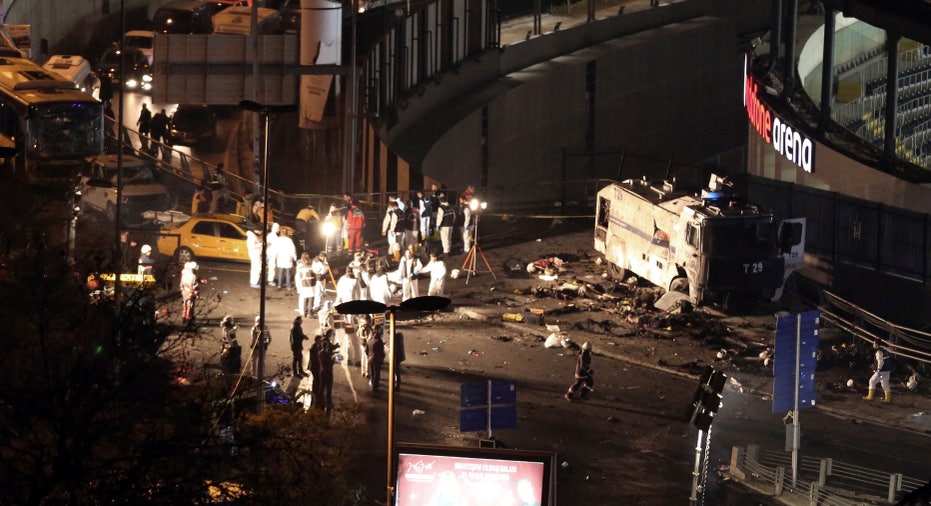At Least 29 Dead, More than 100 Wounded in Istanbul Bombings

Two bombs exploded outside a major soccer stadium in Istanbul on Saturday night, killing at least 29 people and wounding more than a hundred others, a Turkish official said. One of the blasts was thought to be a suicide bomber.
Police cordoned off the area as smoke rose from behind the newly built Vodafone Arena Stadium, known colloquially as Besiktas Stadium after the local team. Witnesses also heard gunfire after the explosions, which apparently targeted police officers. The second blast was thought to be a car bomb.
"We have once again witnessed tonight in Istanbul the ugly face of terror which tramples on every value and decency," Turkish President Recep Tayyip Erdogan said in a statement.
There was no immediate claim of responsibility for the attack. This year, Istanbul has witnessed bombings attributed by authorities to Islamic State or claimed by Kurdish militants. A state of emergency is in force following a failed July 15 coup attempt.
Turkey is a partner in the U.S.-led coalition against Islamic State and its armed forces are active in neighboring Syria and Iraq. It is also facing a renewed conflict with an outlawed Kurdish movement in the southeast.
A taxi driver at the site of the bombings said their force made him hit his head on the taximeter and that his ears were still ringing from the blasts and screaming that followed.
"Amid the screams I heard an officer saying 'do not shout! Do not make them (the perpetrators) be satisfied," said Ismail Coskun.
Interior Minister Suleyman Soylu said the two blasts killed at least 29 people and wounded 166 others. Among the fatalities were 27 police officers, he said.
The minister said 10 people had been arrested in connection with the attacks.
The first and larger explosion took place about 10:30 p.m. local time after the home team Besiktas beat visitor Bursaspor 2-1 in the Turkish Super League. Without giving numbers, Mr. Erdogan said the timing of the attack aimed to maximize the loss of life and vowed the nation would overcome terrorism.
Interior Minister Suleyman Soylu, who gave an initial wounded toll of 20 police officers, rushed from Ankara to Istanbul. The minister didn't disclose who the authorities suspected for the attack but was expected to update casualty figures Sunday.
"It is thought to be a car bomb at a point where our special forces were located, right after the match at the exit where Bursaspor fans" had earlier left, Mr. Soylu said.
He told reports in Istanbul the first explosion took place on a hill adjacent to and overlooking the stadium. The second explosion struck Macka Park and was believed to be a suicide bomb.
The private NTV channel reported that the target of the first attack was a bus for riot police and said nearly 70 wounded were taken to hospitals.
Kurdish militants often target security forces while IS-linked attacks have targeted tourists and the broader public.
Investigators, including Istanbul Police Chief Mustafa Caliskan, were quickly on the scene. Forensic experts in white uniforms scoured the vicinity of the stadium and the park where the suspected suicide bombing took place.
The Besiktas sports club "strongly condemned" the attack and said an employee of one of its stores was among the fatalities, as well as member of its congress who was also responsible for security at the stadium.
Bursaspor reported that none of the wounded were fans and issued a statement wishing "a speedy recovery to our wounded citizens."
Aleksander Ceferin, president of European soccer's governing body UEFA, and European Union Enlargement Commissioner Johannes Hahn, also made statements condemning the attack.
"Violence has no place in a democratic society," Mr. Hahn wrote on Twitter.
EU foreign policy chief Federica Mogherini expressed the bloc's "solidarity with Turkish citizens."
The U.S. Consulate General in Istanbul, meanwhile, urged its citizens to avoid the area which is also home to a Ritz Carlton hotel.
Turkey's radio and television board issued a temporary coverage ban citing national security concerns. It said "to avoid broadcasts that can result in public fear, panic or chaos, or that will serve the aims of terrorist organizations."



















